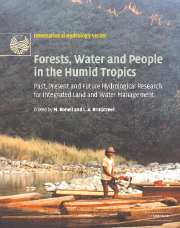 Forests, Water and People in the Humid Tropics
Forests, Water and People in the Humid Tropics Published online by Cambridge University Press: 12 January 2010
Although the areal extent of tropical rainforests has changed markedly through natural fluctuations in climate at a geological time scale, the rate of tropical forest harvesting and clearance during the second half of the twentieth century, has been unprecedented. Fuelled by the soaring demands for tropical hardwoods by ‘northern’ economies, timber harvesting relies heavily on the use of mechanised felling and extraction. This, in turn, has greatly disturbed the remaining vegetation, the soils and therefore the hydrological functioning of the forest. Further, the economic necessity for an adequate return on the capital invested in equipment, vehicles, roads and wood-processing mills makes it desirable to harvest all marketable logs during a single felling cycle, often at the cost of future growth. At the same time, traditional shifting cultivation practices of local communities have become unsustainable in many places due to the increased pressure on the land exerted by a growing population, resulting in gradual degradation or even total disappearance of closed forest. In addition to such ‘unplanned’ forest degradation and conversion there is an increasing trend towards planned, government-led conversions of tropical forest to apparently more profitable cattle ranching or commercial plantations.
The extensive disappearance of tropical forests during the last five decades has raised global alarm over the threats to climatic stability and the hydrological functioning of river basins posed by continued forest conversion, next to the well-being of forest dwellers and the conservation of biodiversity.
To save this book to your Kindle, first ensure [email protected] is added to your Approved Personal Document E-mail List under your Personal Document Settings on the Manage Your Content and Devices page of your Amazon account. Then enter the ‘name’ part of your Kindle email address below. Find out more about saving to your Kindle.
Note you can select to save to either the @free.kindle.com or @kindle.com variations. ‘@free.kindle.com’ emails are free but can only be saved to your device when it is connected to wi-fi. ‘@kindle.com’ emails can be delivered even when you are not connected to wi-fi, but note that service fees apply.
Find out more about the Kindle Personal Document Service.
To save content items to your account, please confirm that you agree to abide by our usage policies. If this is the first time you use this feature, you will be asked to authorise Cambridge Core to connect with your account. Find out more about saving content to Dropbox.
To save content items to your account, please confirm that you agree to abide by our usage policies. If this is the first time you use this feature, you will be asked to authorise Cambridge Core to connect with your account. Find out more about saving content to Google Drive.